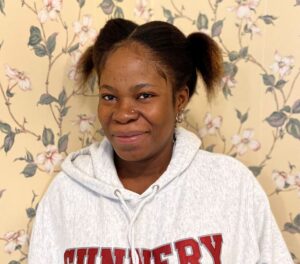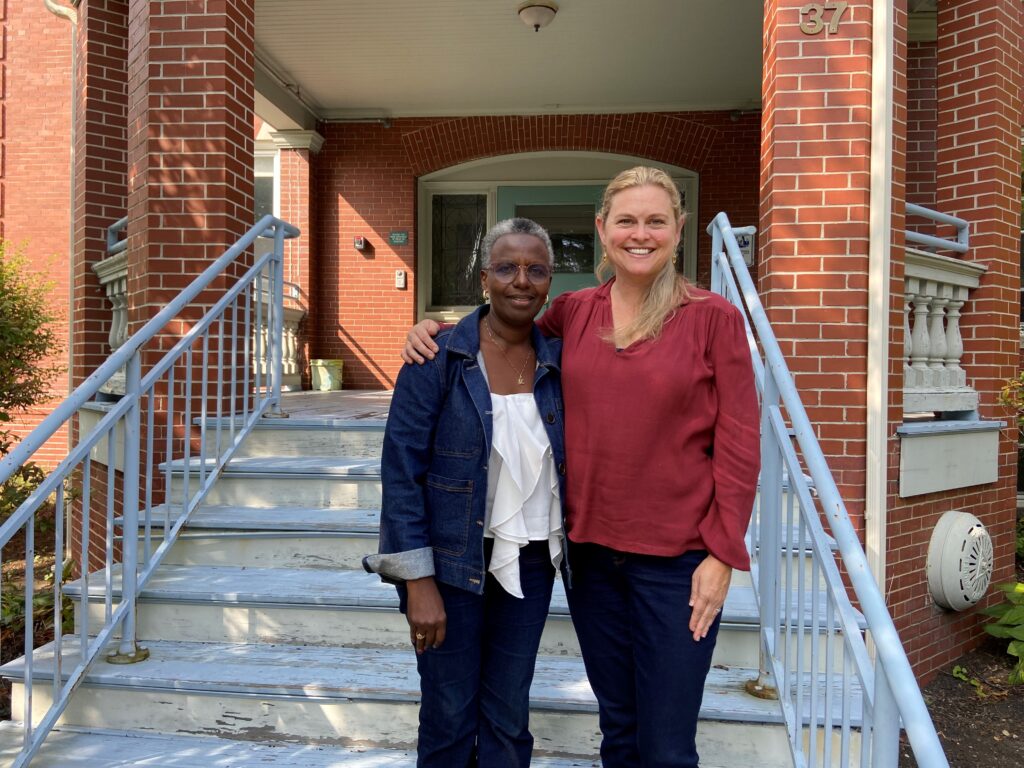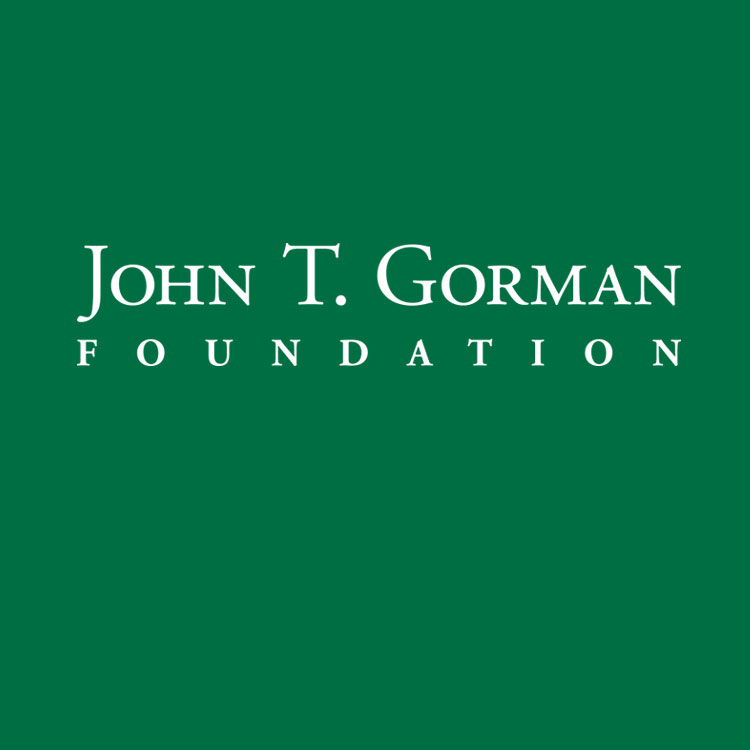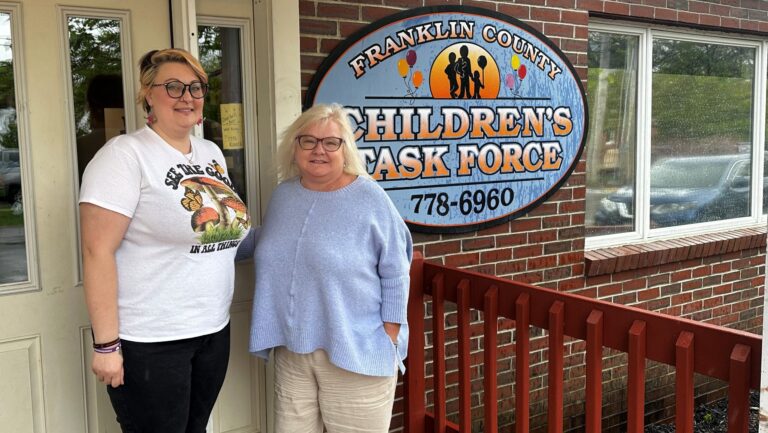Frances Warde initiative aims to provide transitional housing and culturally appropriate services to improve health outcomes for women of color and their children

As an asylum seeker, 25-year-old Dorca had fled violence in her home country of Angola, survived the dangerous passage through the jungles of South and Central America, and spent days in a detention center once arriving in the United States. But her first weeks in Maine were some of the hardest in her journey.
“When I arrived here in Portland, I was in the street,” Dorca said through a French-speaking interpreter. “I was pregnant. I didn’t have any money or food. I cried every day.”
Unhoused and facing an uncertain future, Dorca also encountered threats to her and her baby’s health. Months into her pregnancy, an infection brought her to Northern Light Mercy Hospital last June. Once treated, she still had nowhere to go and faced another night without shelter – until she received a transformative phone call from the Frances Warde home.
“After that, it was an unforgettable day for me,” Dorca said. “Someone was offering to find me a mattress, something to eat. It was a very special moment for me.”
Dorca was not alone in her struggles last spring as Portland faced a high number of unhoused expectant mothers seeking asylum. When the city convened partners to develop strategies, Northern Light Mercy Hospital saw an opportunity to improve the way it delivers care to women of color and New Mainers.
“We were hearing of pregnant women in our midst who were not safe and unhoused. We were seeing multiple cases of late-term miscarriages, no prenatal care, and poor outcomes,” said Melissa Skahan, Vice President of Mission Integration for Northern Light Mercy Hospital. “So we were in a place where we at Mercy were evaluating what we needed to do differently, how we could be more effective in this space.” Through this process, two key needs surfaced that would be critical to improving outcomes for these women and their babies – stable housing and culturally appropriate services.
To this end, Mercy, In Her Presence, the State of Maine, and Community Housing of Maine worked together to establish Frances Warde. Located at a former convent in Portland, the program provides transitional housing while offering a broad array of services to support residents’ immediate needs and long-term success.
The initiative launched last June, with Dorca as the first resident. Today, the house is fully occupied by 15 women and their children, most of them asylum seekers from Angola and Congo. While some elements of the program are still in development, many supports are already in place and working to improve their health and well-being.
To address their health, women receive pre- and postnatal care as well as pediatric care for their children. A community health worker helps coordinate their care, including helping the women understand the purpose of the tests and procedures they’re undergoing, and build trust with providers.
“All healthcare providers use strong interpretative service. However, that is not enough,” Skahan said, adding that there are other barriers to care to address. “We really have to get to a place where every aspect of our care is culturally attuned. Shared decision-making, cultural doulas – all of these different interventions are so important to develop a trusting and balanced relationship between health care and pregnant women. The more they trust us, the more positive outcomes we will see.”

Knowing that culturally appropriate care would facilitate better maternal and infant outcomes, In Her Presence – an Ethnic Community Based Organization with a history of empowering immigrant women – provides on-site doula care, prenatal and nutrition education, and English language classes. This array of supports will soon grow to include workforce development programming through Mercy’s MPower program, which will also be delivered on site and support career pathways in health care.
Importantly, In Her Presence is facilitating community within the house and helping residents build social capital. Residents watch each other’s children during appointments, support each other during their pregnancies, and are building relationships they can lean on in the future.
In Her Presence is also offering social-emotional support for a group of women – and children – who have faced incredible hardship and trauma.
“We’re setting up a space where there is connection, where there is love,” said Claudette Ndayininahaze, In Her Presence Executive Director. “They are not afraid to talk to us, to open up. It’s healing.”
The John T. Gorman Foundation has provided a two-year grant to support the initiative.
“The United States trails every other developed country in keeping birthing women safe, and race is a key factor. Black and Native American women are 23% more likely than all other groups of women to die from childbirth, and preterm birth is a significant contributor to racial disparities in infant mortality,” said Kristen McAuley, Senior Program Associate for the John T. Gorman Foundation. “Increasingly, pregnant moms arrive in Portland with little to no prenatal care; correspondingly, local hospitals are seeing increases in complications during pregnancies and deliveries. In Frances Warde, we see great potential for a model to counter these alarming trends.”
As this program continues to develop, the John T. Gorman Foundation is confident that it will offer many lessons that can be taken to greater scale in improving health outcomes and more. But it is already making an incredible difference for the families in the program.
Giving birth to a healthy baby boy in October, Dorca feels much more hopeful for the future than she did a few months ago.
“I look forward to getting an education, to educating my son, being useful for the community,” she said. “I am hopeful that if I do well, I will someday have my own place to live. I have hopes. With this support, I know I can succeed.”


